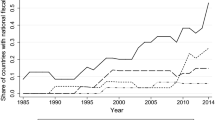Abstract
This paper uses a simultaneous equations model to analyze increases in intergovernmental fiscal transfers and associated vote changes in Portuguese legislative elections. The results suggest that election year increases in transfers by the central government to municipalities secure added votes, and that these transfers are targeted at jurisdictions where the government faces the risk of losing support.
Similar content being viewed by others
References
Aidt, T. S., Veiga, F. J., & Veiga, L. G. (2011). Election results and opportunistic policies: a new test of the rational political business cycle model. Public Choice, 148(1–2), 21–44.
Alesina, A., & Rosenthal, H. (1996). A theory of divided government. Econometrica, 64(6), 1311–1341.
Ansolabehere, S., & Snyder, J. M. (2006). Party control of state government and the distribution of public expenditures. Scandinavian Journal of Economics, 108(4), 547–569.
Boadway, R., & Shah, A. (2006). Intergovernmental fiscal transfers. Washington: World Bank.
Carlsen, F. (1997). Opinion polls and political business cycles: theory and evidence for the United States. Public Choice, 92, 387–406.
Case, A. (2001). Election goals and income redistribution: recent evidence from Albania. European Economic Review, 45, 405–423.
Clingermayer, J. C., & Wood, B. D. (1995). Disentangling patterns of state debt financing. American Political Science Review, 89(1), 108–120.
Couch, J. F., & Shughart, W. F. II (1998). The political economy of the New Deal. Cheltenham/Northampton: Edward Elgar.
Cox, G., & McCubbins, M. (1986). Electoral politics as a redistributive game. Journal of Politics, 48(2), 370–389.
Dahlberg, M., & Johansson, E. (2002). On the vote-purchasing behavior of incumbent governments. American Political Science Review, 96(1), 27–40.
Dixit, A., & Londregan, J. (1998). Fiscal federalism and redistributive politics. Journal of Public Economics, 68, 153–180.
Downs, A. (1957). An economic theory of democracy. New York: Harper Collins.
Duch, R., & Stevenson, R. (2008). The economic vote: how political and economic institutions condition election results. Cambridge: Cambridge University Press.
Fiorina, M. P. (1981). Some problems in studying the effects of resource allocation in congressional elections. American Journal of Political Science, 25(3), 543–567.
Fishback, P. V., Kantor, S., & Wallis, J. J. (2003). Can the New Deal’s three Rs be rehabilitated? A program-by-program, county-by-county analysis. Explorations in Economic History, 40(3), 278–307.
Frey, B., & Schneider, F. (1978). An empirical study of politico-economic interaction in the United States. Review of Economics and Statistics, 60, 174–183.
Garrett, T. A., & Sobel, R. S. (2003). The political economy of FEMA disaster payments. Economic Inquiry, 41(3), 496–509.
Johansson, E. (2003). Intergovernmental grants as a tactical instrument: empirical evidence from Swedish municipalities. Journal of Public Economics, 87, 883–914.
Kramer, G. H. (1971). Short-term fluctuations in US voting behavior, 1896–1964. American Political Science Review, 65, 131–143.
Levitt, S., & Snyder, J. (1997). The impact of federal spending on House election outcomes. Journal of Political Economy, 105(1), 30–53.
Lindbeck, A., & Weibull, J. (1987). Balanced-budget redistribution as the outcome of political competition. Public Choice, 52, 273–297.
Lindbeck, A., & Weibull, J. (1993). A model of political equilibrium in a representative democracy. Journal of Public Economics, 51, 195–209.
Mueller, J. E. (2003). Public choice III. Cambridge: Cambridge University Press.
Oates, W. E. (1999). An essay on fiscal federalism. Journal of Economic Literature, XXXVII, 1120–1149.
Paldam, M. (2004). Are vote and popularity functions economically correct? In C. K. Rowley & F. Schneider (Eds.), The encyclopedia of Public Choice (pp. 49–59). Netherlands: Kluwer Academic.
Price, S. (1998). Comment on ‘The politics of the political business cycle’. British Journal of Political Science, 28(1), 201–210.
Schultz, K. A. (1995). The politics of political business cycle. British Journal of Political Science, 25(1), 79–99.
Shughart, W. F. II (2006). Katrinomics: the politics and economics of disaster relief. Public Choice, 127, 31–53.
Silva Costa, J. (2008). Local governments in Portugal. Urban Public Economics Review, 9, 55–74.
Sobel, R. S., & Leeson, P. T. (2006). Government’s response to Hurricane Katrina: a public choice analysis. Public Choice, 127, 55–73.
Solé-Ollé, A., & Sorribas-Navarro, P. (2008). The effects of partisan alignment on the allocation of intergovernmental transfers. Differences-in-differences estimates for Spain. Journal of Public Economics, 92, 2302–2319.
Stein, R., & Bickers, K. (1994). Congressional elections and the pork barrel. Journal of Politics, 56(2), 377–399.
Stigler, G. J. (1973). General economic conditions and national elections. American Economic Review, 63(2), 160–167.
Veiga, L. G., & Pinho, M. M. (2007). The political economy of intergovernmental grants: evidence from a maturing democracy. Public Choice, 133, 457–477.
Veiga, L. G., & Veiga, F. J. (2007a). Does opportunism pay off? Economics Letters, 96(2), 177–182.
Veiga, L. G., & Veiga, F. J. (2007b). Political business cycles at the municipal level. Public Choice, 131, 45–64.
Wallis, J. J. (1998). The political economy of New Deal spending revisited, again: with and without Nevada. Explorations in Economic History, 35(2), 140–170.
Weingast, B. R. (2009). Second generation fiscal federalism: the implications of fiscal incentives. Journal of Urban Economics, 65, 279–293.
Wright, G. (1974). The political economy of New Deal spending: an econometric analysis. Review of Economics and Statistics, 56(1), 30–38.
Author information
Authors and Affiliations
Corresponding author
Rights and permissions
About this article
Cite this article
Veiga, L.G., Veiga, F.J. Intergovernmental fiscal transfers as pork barrel. Public Choice 155, 335–353 (2013). https://doi.org/10.1007/s11127-011-9863-2
Received:
Accepted:
Published:
Issue Date:
DOI: https://doi.org/10.1007/s11127-011-9863-2




